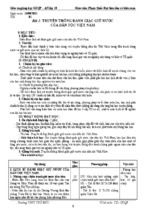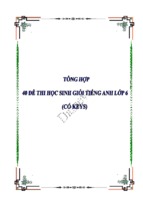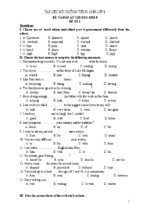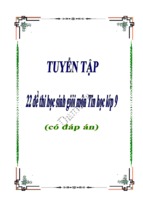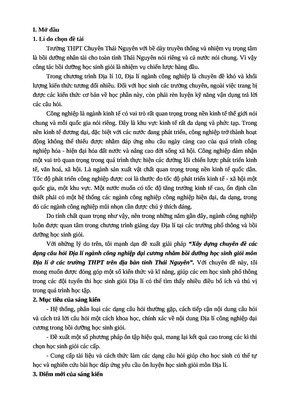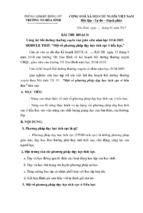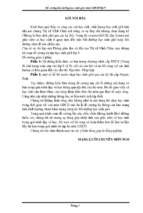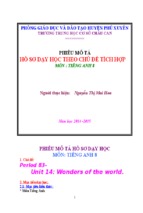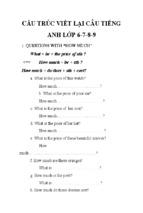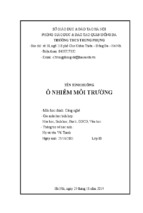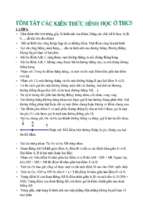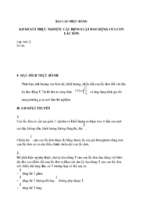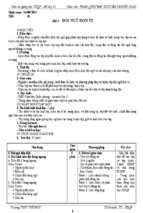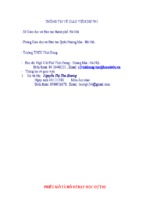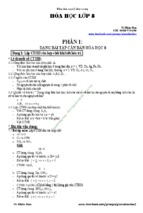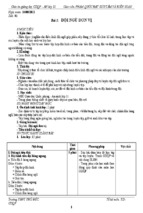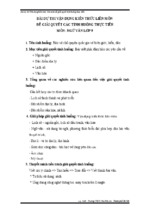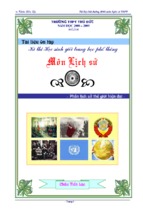LESSON 1:
Prounciation and stress
I. Ngữ âm:
BẢNG PHIÊN Â TIÊẾNG ANH
1. Cách phát âm –ed:
- Có 3 cách phát âm –ed:
* đọc thành âm /id/ với những từ có âm cuốối là / t, d /
* đọc thành âm /t/ với những từ có âm cuốối là /p, f, k, s, ∫, t∫, θ /
* đọc thành âm /d/ với những trường hợp còn lại
Ex:
/id/
/t/
/d/
- dedicated
- stopped
- opened
- devoted
- laughed
- arrived
- pretended
- liked
- discovered
- needed
- washed
- interviewed
2. Cách phát âm của –s / -es
- Có 3 cách phát âm –s hoặc –es:
* đọc thành âm /s/ với những từ có âm cuốối là / p, f, k, t, θ /
* đọc thành âm /iz/ với những từ có âm cuốối là / s, z, ∫, t∫, dƷ/
* đọc thành âm /z/ với những trường hợp còn lại
Ex:
/s/
- cups
- laughs
- likes
- baths
/iz/
- buses
- washes
- watches
- boxes
/z/
- tables
- swallows
- schoolyards
- days
1
3. Cách đánh dâấu trọng âm:
a. Từ có 2 âm tiếất: Trọng âm có thể rơi vào âm tiếốt đâầu hoặc âm tiếốt thứ hai.
- Danh từ và tính từ:
- Trọng âm được đặt ở vâần đâầu
Ex: ‘table, ‘happy, ‘lucky, ‘weather……
- Một sốố danh từ có trọng âm ở từ gốốc
Ex: de’sign, be’lief, ac’cept, de’mand………..
Danh từ tận cùng –OO hay –OON: trọng âm đặt trến vâần này
Ex: after’noon, bam’boo, bal’loon……..
- Động từ:
- động từ tận cùng bằầng –OW, -EN, -Y, -EL, -LE, -ISH: tr ọng âm ở vâần th ứ nhâốt
Ex: ‘follow, ‘finish, ‘carry, ‘suffer, ‘harden, ‘answer………
- động từ tận cùng bằầng –ATE: trọng âm đặt ở vâần hai
Ex: trans’late, cre’ate……..
- Từ hai vâần vừa là danh từ vừa là động từ:
+ Trọng âm được đặt ở vâần thứ nhâất khi chúng là danh từ
Ex: ‘record, ‘object……
+ Trọng âm được đặt ở vâần thứ hai khi chúng là động từ
Ex: re’cord, ob’ject……
Note: Khống phải tâốt cả các từ hai vâần vừa là danh từ vừ là động t ừ đếầu theo qui tằốt này
- Một sốố từ có trọng âm ở vâần thứ nhâốt: purchase, promise, sorrow……..
- Một sốố từ có trọng âm ở vâần thứ hai: regret, surprise, control…….
- Giới từ: trọng âm được đặt ở từ gốấc
Ex: be’hind, be’fore, a’bove……..
- Từ ghép:
- Danh từ: trọng âm thường đặt ở từ đâầu
Ex: ‘baseball, ‘schoolbag, ‘drugstore…..
- Tính từ: trọng âm thường đặt ở vâần thứ hai
Ex: good-‘looking, bad-‘tempered, old-‘fashioned
- Đại từ phản thân: trọng âm đặt ở vâần “self / selves”
Ex: my’self, him’self, them’selves
b. Từ có 3 âm tiếất:
- Những từ có hậu tốố là: -ade, -ee, -ese, -ette, -ique, -eer, -ain thì trọng âm chính
rơi vào ngay âm tiếất đó
Ex: lemo’nade, ciga’rette, Vietna’mese, enter’tain …
- Âm tiếốt liếần trước các hậu tốố -tion, thường nhận trọng âm
Ex:, trans’lation
- Từ tận cùng bằầng –ate thường đặt ở âm thứ 3 tính từ cuốấi
Ex: ‘generate, cer’tificate, cong’ratulate
c. Từ có 3 âm tiếất trở lến:
- Những từ tận cùng bằầng các hậu tốố -ic, -ual, -ian, -ical, -ity, -graphy, -ics, -logy
âm tiếốt liếần trước nó thường nhận trọng âm
Ex: eco’nomic, intel’lectual, mathema’tician, poli’tician, eco’nomical, uni’versity,
ge’ography, mathe’matics soci’ology
- Trọng âm đặt ở âm thứ 2 trước các hậu tốố -ize, -ary
Ex: ‘modernize, ‘dictionary, i’maginary
2
PRACTICE
STRESS
A. adorable
B. ability
C. impossible
D. entertainment
A. engineer
B. corporate
C. difficult
D. different
A. popular
B. position
C. horrible
D. positive
A. selfish
B. correct
C. purpose
D. surface
A. permission
B. computer
C. million
D. perfection
A. scholarship
B. negative
C. develop
D. purposeful
A. ability
B. acceptable
C. education
D. hilarious
A.document
B. comedian
C. perspective
D. location
A. provide
B. product
C. promote
D. profess
A. different
B. regular
C. achieving
D. property
A. education
B. community
C. development
D. unbreakable
A. politics
B. deposit
C. conception
D. occasion
A. prepare
B. repeat
C. purpose
D. police
A. preface
B. famous
C. forget
D. childish
A. cartoon
B. western
C. teacher
D. theater
A. Brazil
B. Iraq
C. Norway
D. Japan
A. scientific
B. ability
C. experience
D. material
A. complain
B. luggage
C. improve
D. forgive
A. offensive
B. delicious
C. dangerous
D. religious
A. develop
B. adjective
C. generous
D. popular
A. beautiful
B. important
C. delicious
D. exciting
A. element
B. regular
C. believing
D. policy
A. punctual
B. tolerant
C. utterance
D. occurrence
A. expensive
B. sensitive
C. negative
D. sociable
A. education
B. development
C. economic
D. preparation
A. attend
B. option
C. percent
D. become
A. literature
B. entertainment
C. recreation
D. information
A. attractive
B. perception
C. cultural
D. expensive
A. chocolate
B. structural
C. important
D. national
A. cinema
B. position
C. family
D. popular
A. natural
B. department
C. exception
D. attentive
A. economy
B. diplomacy
C. informative
D. information
A. arrest
B. purchase
C. accept
D. forget
A. expertise
B. cinema
C. recipe
D. similar
3
A. government
B. musician
C. disgusting
D. exhausting
A. successful
B. interest
C. arrangement
D. disaster
A. competition
B. repetition
C. equivalent
D. disappointment
A. private
B. provide
C. arrange
D. advise
A. academic
B. education
C. impossible
D. optimistic
A. study
B. knowledge
C. precise
D. message
A. industry
B. performance
C. importance
D. provision
A. contain
B. express
C. carbon
D. obey
A. impress
B. favor
C. occur
D. police
A. regret
B. selfish
C. purpose
D. preface
A. govern
B. cover
C. perform
D. father
A. writer
B. teacher
C. builder
D. career
A. morning
B. college
C. arrive
D. famous
A. ambitious
B. chocolate
C. position
D. occurrence
A. furniture
B. abandon
C. practical
D. scientist
A. devote
B. compose
C. purchase
D. advise
A. remember
B. influence
C. expression
D. convenient
A. medium
B. computer
C. formation
D. connection
A. national
B. cultural
C. popular
D. musician
A. successful
B. humorous
C. arrangement
D. attractive
A. construction
B. typical
C. glorious
D. purposeful
A. accident
B. courageous
C. dangerous
D. character
A. accordance
B. various
C. balcony
D. technical
A. telephone
B. photograph
C. accurate
D. important
A. romantic
B. illusion
C. description
D. incident
A. bankruptcy
B. successive
C. piano
D. phonetics
A. designer
B. origin
C. history
D. quality
A. capital
B. construction
C. announcement
D. eventful
A. apartment
B. tradition
C. different
D. expensive
A. monitor
B. organize
C. following
D. inviting
A. accurate
B. discussion
C. sentiment
D. industry
A. probable
B. assembly
C. forgetful
D. decisive
A. damage
B. faster
C. regret
D. study
A. factory
B. reporter
C. actress
D. coverage
A. amazing
B. following
C. covering
D. finishing
A. because
B. become
C. beneath
D. beggar
4
PRONUNCIATION
Exercise 1 : Pick out the word whose underlined and bold part is pronounced differently from of the
other words.
1.
A. proofs
B. books
C. points
D. days
2.
A. helps
B. laughs
C. cooks
D. finds
3.
A. neighbors
B. friends
C. relatives
D. photographs
4.
A. snacks
B. follows
C. titles
D. writers
5.
A. streets
B. phones
C. books
D. makes
6.
A. cities
B. satellites
C. series
D. workers
7.
A. develops
B. takes
C. laughs
D. volumes
8.
A. phones
B. streets
C. books
D. makes
9.
A. proofs
B. regions
C. lifts
D. rocks
10. A. involves
B. believes
C. suggests
D. steals
11. A. remembers
B. cooks
C. walls
D. pyramids
12. A. miles
B. words
C. accidents
D. names
13. A. sports
B. plays
C. chores
D. minds
14. A. nations
B. speakers
C. languages
D. minds
15. A. proofs
B. looks
C. lends
D. stops
16. A. dates
B. bags
C. photographs
D. speaks
17. A. parents
B. brothers
C. weekends
D. feelings
18. A. chores
B. dishes
C. houses
D. coaches
19. A. works
B. shops
C. shifts
D. plays
20. A. coughs
B. sings
C. stops
D. sleeps
Exercise 2: Pick out the word whose underlined and bold part is pronounced differently from of the
other words.
1. A. failed B. reached
C. absorbed
D. solved
2. A. invited
B. attended
C. celebrated
D. displayed
3. A. removed
B. washed
C. hoped
D. missed
4. A. looked
B. laughed
C. moved
D. stepped
5. A. wanted
B. parked
C. stopped
D. watched
6. A. laughed
B. passed
C. suggested
D. placed
7. A. believed
B. prepared
C. involved
D. liked
8. A. lifted B. lasted
C. happened
D. decided
9. A. collected
B. changed
C. formed
D. viewed
10. A. walked
B. entertained
C. reached
D. looked
11. A. watched
B. stopped
C. pushed
D. improved
12. A. admired
B. looked
C. missed
D. hoped
13. A. proved
B. changed
C. pointed
D. played
14. A. helped B. laughed
C. cooked
D. intended
15. A. smoked
B. followed
C. titled
D. implied
16. A. coughed
B. phoned
C. booked
D. stopped
17. A. talked B. looked
C. naked
D. worked
18. A. developed
B. ignored
C. laughed
D. washed
19. A. phoned
B. stated
C. mended
D. old-aged
20. A. clapped
B. attracted
C. lifted
D. needed
Exercise 3: Pick out the word whose underlined and bold part is pronounced differently from of the
other words.
1. A) nurse
B) films
C) stops
D) coughs
2. A) artificial
B) distance
C) centre
D) cells
3. A) designer
B) zoo
C) Switzerland
D) tables
4. A) although
B) width
C) thump
D) thank
5. A) thought
B) tough
C) bought
D) fought
6. A) raised
B) talked
C) watched
D) laughed
7. A) homeless
B) done
C) become
D) month
8. A) hidden
B) minor
C) written
D) kitten
9. A) many
B) lamb
C) handle
D) camera
5
10. A) there
11. A) occupy
12. A) accident
13. A) private
14. A) instruction
15. A) necessarily
16. A) basic
17. A) worry
18. A) mile
19. A) relaxed
20. A) picked
21. A) women
22. A) food
23. A) property
24. A) much
25. A) particular
26. A) Africa
27. A) cat
28. A) respect
29. A) good
30. A) brain
31. A) forget
32. A) easy
33. A) prepare
34. A) pleasant
35. A) child
36. A) threaten
37. A) English
38. A) main
39. A) preserve
40. A) nightmare
41. A) heart
42. A) fear
43. A) cost
44. A) nation
45. A) enough
46. A) phoned
47. A) can
48. A) enough
49. A) machine
50. A) wants
51. A) surface
52. A) chew
53. A) chat
54. A) teach
55. A) cow
56. A) case
57. A) oxygen
58. A) count
59. A) complete
60. A) rhinoceros
61. A) involved
B) appear
B) puppy
B) success
B) irrigate
B) shrub
B) mechanic
B) erosion
B) infer
B) militant
B) mounted
B) considered
B) bench
B) good
B) access
B) number
B) park
B) access
B) certain
B) send
B) book
B) lamb
B) open
B) seat
B) engine
B) health
B) chill
B) breath
B) Africa
B) certain
B) sack
B) care
B) earn
B) near
B) most
B) vase
B) account
B) called
B) cell
B) courage
B) cheap
B) books
B) necklace
B) news
B) sad
B) meet
B) low
B) age
B) slowly
B) amount
B) object
B) habitat
B) decided
C) wear
C) ready
C) accurate
C) guidance
C) eruption
C) exception
C) loose
C) dirtying
C) smile
C) collected
C) stayed
C) lend
C) look
C) possession
C) cut
C) smart
C) ache
C) cook
C) set
C) use
C) comb
C) popular
C) learn
C) invention
C) breath
C) chemistry
C) health
C) Chinese
C) complain
C) reason
C) Are
C) heard
C) clear
C) hot
C) nature
C) surround
C) cooked
C) call
C) encounter
C) teacher
C) stops
C) face
C) crew
C) state
C) feather
C) how
C) carry
C) healthy
C) mountain
C) defend
C) vehicle
C) explained
D) prepare
D) study
D) accept
D) environment
D) supply
D) apprentice
D) recycle
D) fertilizer
D) kind
D) needed
D) received
D) spend
D) blood
D) American
D) put
D) hard
D) man
D) Canadian
D) then
D) sugar
D) climb
D) font
D) eat
D) electricity
D) breathe
D) teacher
D) breathe
D) America
D) explain
D) poison
D) share
D) learn
D) pear
D) lot
D) grade
D) outdoor
D) climbed
D) cold
D) nourish
D) child
D) sends
D) palace
D) screw
D) map
D) seat
D) round
D) vapour
D) supply
D) course
D) prevent
D) whale
D) swallowed
6
LESSON 2:
SENTENCE’S STRUCTURE – PARTS OF SPEECH –
CLAUSES
Bài 2: Câấu trúc câu - Từ loại – Mệnh đếầ
I, Sentence’s structure – Câấu trúc câu
1, Main clauses – Mệnh đếầ chính
- Bao gốầm S + V (trừ mệnh đếầ mệnh lệnh) (động từ có thể là đ ộng t ừ thường hoặc to be)
2, Other clauses – Mệnh đếầ phụ
- Bao gốầm mệnh đếầ trạng ngữ, mệnh đếầ quan hệ * và mệnh đếầ danh ng ữ (ch ương trình trung h ọc ph ổ thống)
II, Từ loại và cách phân biệt
1. Cách nhận biếất từ loại dựa vào tiếần tốấ và hậu tốấ (đốấi với phâần l ớn t ừ c ơ b ản):
a. Cánh nhận biếất danh từ: danh từ thường có các hậu tốố sau:
-TION/ -ATION
prevention, invention, preservation, conservation, information
-MENT
development, employment, disappointment, instrument
-ENCE/-ANCE
existence, difference, importance
-NESS
richness, happiness, business
-ER (chỉ người)
teacher, speaker, worker, writer, singer
-OR (chỉ người)
sailor, inventor, visitor, actor, editor
-IST (chỉ người)
physicist, typist, biologist, chemist, guitarist
-AR/-ANT/-EE (chỉ người)
beggar, assistant, employee, interviewee
-ING
teaching, understanding, schooling, building
-AGE
teenage, marriage, passage, package, drainage
-SHIP
friendship, scholarship, championship
-ISM (chủ nghĩa)
pessimism, optimism, criticism, idealism (chủ nghĩa duy tâm)
-(I)TY
possibility, responsibility, reality, beauty, safety, variety
(verb)-AL
refusal, arrival, survival
-TH
width, warmth, strength, youth, truth, depth
b. Cánh nhận biếất tính từ: tính từ thường có các hậu tốố sau:
-FUL
harmful, useful, successful, helpful, beautiful
-LESS (nghĩa phủ định)
homeless, careless, treeless
(noun)-Y (có nhiếầu)
rainy, snowy, sandy, windy
(noun)-LY (có vẻ, hàng ngày giờ.ngày..) manly, friendly, motherly, yearly, hourly, daily
-ISH
foolish, selfish, childish
(noun)-AL (thuộc vếầ)
industrial, natural, agricultural, musical
-OUS
poisonous, nervous, dangerous, famous
-IVE
active, expensive, attractive, progressive
-IC
artistic, electric, economic
-ABLE
countable, fashionable, comfortable, acceptable
c. Cánh nhận biếất động từ: động từ thường có tiếần tốố hoặc hậu tốố sau:
Tiếần tốố ENendanger, enlarge, enrich (làm giàu), encourage (động viến)
-FY
classify, modify, satisfy
-IZE, -ISE
socialize, modernize, industrialize
-EN
widen, frighten, brighten, sharpen
-ATE
considerate, translate, nominate
d. Cánh nhận biếất trạng từ: trạng từ thường có hậu tốố -LY. Ex: beautifully, carefully, suddenly, carelessly,
recently ...
Lưu ý: Một sốố trạng từ đặc biệt câần ghi nhớ:
- good (a)
well (adv): giỏi, tốốt
- late (a)
late (adv)
lately (adv): trếễ, chậm
- ill (a)
ill (adv): xâốu, tốầi, kém
- fast (a)
fast (adv): nhanh
7
- hard (a)
hard (adv): tích cực, vâốt vả, chằm chỉ hardly (adv): hâầu như khống
2. Chức năng của một sốấ từ loại (dựa vào vị trí để xác định lo ại từ):
Các thành phâần câu chính: Adj – N và V – Adv (v ới v ị trí t ương ứng)
+ Bổ sung cho N là Adj đứng trước N
+ Bổ sung cho V và Adj là Adv (V + Adv và Adv + Adj)
+ Ngoài ra chú ý tình huốống với prep (giới từ): N + prep + N (tr ước sau prep đếầu là N) (tr ừ tr ường h ợp V +
prep hoặc Adj + prep)
Eg: The color of a star depends on the heat of the energy it produces
a. Danh từ (Noun)
Vị trí của danh từ
Ví dụ
Sau tính từ
(adj + N)
They are interesting books.
Sau từ hạn định gốầm:
- mạo từ: a /an / the
He is a student.
- từ chỉ định: this, that, these, those, every, each, … These flowers are beautiful.
- từ chỉ sốố lượng: many, some, few, little, several, ... She needs some water.
- tính từ sở hữu: my, his, her, your, our, their, its, …
Sau ngoại động từ (V câần O)
She buys books.
She meets a lot of people.
Sau giới từ
(prep. + N)
He talked about the story yesterday.
He is interested in music.
Trước V chia thì (N làm chủ từ)
The main has just arrived.
Sau enough
(enough + N)
I don’t have enough money to buy that house.
b. Tính từ (Adj)
Trước N
(Adj + N)
Sau TO BE
Sau: become, get, look, feel, taste, smell, seem …
This is an interesting books.
I am tired.
It becomes hot.
She feels sad.
Sau trạng từ
(adv + adj)
It is extremely cold.
I’m terribly sorry.
She is very beautiful.
Sau keep / make
The news made me happy.
Sau too
( be + too + adj)
That house is too small.
Trước enough
(be + adj + enough)
The house isn’t large enough.
Trong câấu trúc:
be + so + adj + that
She was so angry that she can’t speak.
A, an, the, this, that, his, her, their, my, … + (Adj) + My new car is blue.
Noun
Trong câu cảm thán:
- How + adj + S + V
How beautiful the girl is!
- Wht + (a / an) + adj + N
What an interesting film!
c. Trạng từ (Adv)
Sau V thường
Trước Adj
Giữa cụm V
Đâầu câu hoặc trước dâốu phẩy
Sau too
V + too + adv
Trong câấu trúc
V + so + adv + that
Trước enough
V + adv + enough
He drove carefully.
I meet an extremely handsome man.
She has already finished the job.
Unfortunately, I couldn’t come the party.
They walked too slowly to catch the bus.
Jack drove so fast that he caused an accident.
You should write clearly enough for every body to read.
8
PRACTICE
1. If you need an extra bed for your guest, you can use one of __________.
A. our
B. us
C. ours
D. we
2. Maryam was really ________ by the beauty of Ha Noi.
A. impressed
B. impress
C. impression
D. impressive
3. Vietnamese people are very ________ .
A. friend
B. friendless
C. friendly
D. friendship
4. That teacher is a (n) __________ one. His pupils like his sense of humor.
A. amusing
B. amused
C. amusement
D. self- amused
5. The children are playing ____in the schoolyard.
A. happy
B. happiness
C. happier
D. happily
6. I saw a lot of stamps on your table. Are you a stamp _____?
A. collecting
B. collector
C. collect
D. collection
7. I want everybody to listen ______.
A. care
B. careful
C. careless
D. carefully
8. Maria’s English is excellent. She speaks English ____.
A. very perfect B. perfective
C. perfectively
D. perfectly
9. He ______to find a job but he had no luck.
A. hardly tried
B. tried hardly
C. hard tried
D. tried hard
10. She sings very______. She is one of the best singers in our school.
A. beauty
B. beautiful
C. beautify
D. beautifully
11. Be________! He is looking at you.
A. care
B. careful
C. carefully
D. carelessly
12. Be________! He is looking at you.
A. care
B. careful
C. carefully
D. carelessly
13. Ha Noi is a ________ city.
A. beauty
B. beautiful
C. beautifully
D. friendly
14. Mrs. White is very________She goes to the Church everyday.
A. religion
B. regioner
C. religious
D. region
15. My uncle was a _______He had a large collection of musical.
A. music
B. musical
C. musician
D. instrument
16. New opportunities will emerge as the _____ climate improves.
A. economics
B. economic
C. economical
D. economy
17. Mom always _____ us to discuss our problems.
A. encourage
B. encouragement
C. encouraging
D. encouraged
18. He's a choreographer who has drawn _____ from Javanese dance.
A. inspired
B. inspires
C. inspiration
D. inspiring
19. The dragon _____ the enemies of the Church.
A. symbolizes
B. symbols
C. symbolic
D. symbolism
20. The problem is not _____ to British students.
A. unique
B. uniqueness
C. uniquely
D. unitary
21. It's a _____ Italian restaurant. There are a lot of delicious food at that restaurant.
A. fashion
B. fashionable
C. fashions
D. fashionably
22. She presented her ideas clearly and _____.
A. logically
B. logic
C. logical
D. logics
23. Nguyen Du is a famous Vietnamese ______ .
A. poem
B. poetry
C. poetic
D. poet
24. My uncle was a __________ He had a large collection of musical instrument.
A. music
B. musical
C. musically
D. musician
25. Jean cloth was__________ made from cotton .
A. complete
B. completely C. completed
D. completing
26. It’s _______to call anyone at night .
A. convenience B. inconvenience
C. inconvenientD. convenient
27. The Ao dai is the ______ Dress of Vietnamese women .
A. beautiful
B. traditional
C. casual
D. traditional
28. __________, Aodai was frequently worn by both men and women
A. Tradition
B. Tradional
C. in traditional
D. traditionally
29. He finds his new shirt very ___________ . It will be his favourite one.
A. comfortable
B. comfortably
C. uncomfortable
D. uncomfortably
30. Many designers have taken__________ from VietNam ethnic minorities
9
A. inspire
B. inspiration
C. inspired
D. inspirational
31. Ha Noi is a busy __________city
A. modern
B. modernize
C. moderned
D. moderning
32. She was really impressed by the ________of the city and by the ________of its people
A. beautiful/ friendly B. beauty/friend
C. beauty / friendly
D. beauty/ friendliness
33. He drives very _____ and has got two accidents this year.
A. careless
B. carefully
C. carelessly
D. careful
33. She was having a rest when the volcano _______ .
A. erupted
B. flew
C. flowed
D. broke
34. Two hundred people died in that volcano ______.
A. corruption
B. eruption
C. destruction
D. reduction
35. Tidal waves are the result of an _______ shift in the underwater movement of the Earth .
A. amazing
B. alternative
C. abrupt
D. unpleasant
36.________are funnel-shaped storms passing overland below a thunderstorm.
A. Earthquakes B. Tropical storms
C. Hurricanes
D. Tornadoes
37. In 1995 , a huge earthquake struck Kobe city in Japan and caused severe _______
A. damage
B. destruction
C. shift
D. collapse
38. The earthquake _______ the city at 2 this morning
A. occurred
B. hit
C. swept
D. measured
39. Thousands of people were saved because scientists had__them about the volcanic eruption.
A. said
B. spoke
C. warned
D. talked
40. A tropical storm which reaches 120 kilometers an hour is called a _______ in North and South America.
A. typhoon
B. cyclone
C. hurricane
D. tornado
41. Ninety percent of earthquakes occur _______ the Pacific Rim.
A. around
B. at
C. in
D. about
42. The roof ________ under the weight of snow last night.
A. collapsed
B. fell
C. dropped
D. flew
43. A tornado looks like a big, dark _______ coming from the bottom of a storm cloud.
A. funnel
B. bowl
C. mushroom
D. cloud
44. Early warnings about tornadoes could save many __________.
A.lives
B. life
C. living
D. things
45. Yesterday a typhoon _________ a coastal city in the country.
A. hit
B. strike
C.collapsed
D. predicted
46. People can know when a volcano will ________ nowadays, can't they ?
A. break
B. warn
C. erupt
D. seek
47. A tropical storm is called a hurricane in North and South America when it _____ 120 kilometers per hour.
A. reaches
B. goes
C. gets
D. comes
48. A ____ is a very large wave.
A. tidal wave
B. tsunami
C. tornado
D. a and b are correct.
49. A / An __________ is a sudden strong shaking of the ground.
A. snowstorm
B. tidal wave
C. earthquake D. volcano.
50. A _______ is a tropical storm with strong winds.
A. typhoon
B. tornado
C. volcano
D. tsunami
51. It was an…………day.
A. enjoying
B. enjoyed
C. enjoyment
D. enjoyable
52. There is no ______that he has been here.
A. evidence
B. evidential
C. evidentially
D. evident
53. The disease was thought to have______in Africa.
A. appeared
B. disappearingC. disappeared
D. appearing
54. The man ______without trace.
A. disappeared
B. disappearingC. appeared
D. appearing
55. UFOs mean ______ flying objects.
A. unidentified
B. unknown
C. unable
D. unknown
56. Some scientists say that flying saucers might be people's______
A. imagination
B. imagine
C. imaginative
D. imaginary
57. Imagine someday you would live without ______
A. electricity
B. electric
C. electrician
D. electrical
58. You must get a letter from the doctor that shows you are in perfect ________.
A. health
B. healthy
C. healthful
D. healthily
10
LESSON 3:
VERB TENSE AND VERB FORM and clauses
PART A: VERB TENSE
Hình Thức Cơ Bản Của Động Từ Trong Tiếng Anh
hình thức
Khẳng định
Phủ
Nghi vấn
Will + S + V0 ?
will
V0
thêm not
Do + S + V0 ?
V1/s/es
do not V0
Did + S + V0 ?
V2/ed
did not V0
Have + S + V3/ed ?
have
V3/ed
thêm not
Has + S + V3/ed ?
has
V3/ed
thêm not
Is/.. + S + V_ing ?
is/are/am V_ing
thêm not
Was + S + V_ing ?
was/were
thêm not
Phủ định thêm not ,riêng V1/s/es/2/ed thì mượn don’t/doesn’t/didn’t
S
THÌ
Will Vo
CÁCH SỬ DỤNG
Trạng Từ (TỪ CHÌA KHÓA)
Someday, tomorrow, next + time, soon…
-Often, usually,always, constantly, sometimes,
occasionally, seldom, rarely, hardly,
V1/s/es
-every + time ( every day/ week/ month…)
-Once a week, twice a month, 3 times a week..1,2,3
- Last + (time); - (time) + ago
Hành động đã xảy ra và kếốt thúc trong quá khứ,
V2/ed
- Yesterday ; In 1999…
khống liến quan gì đếốn hiện tại.
- When I was a boy/ a child/ 5 years
* just ,recently ,lately gâần đây *before
1- Vừa mới xảy ra.
* ever đã .. từng * never
chưa ..
2- Lặp đi lặp lại nhiếầu lâần trong quá khứ.( 1 haønh
từng
ñoäng dieãn ra nhieàu laàn keå töø quaù khöù
* already đã …xong
* yet chưa …xong
ñeán hieän taïi several times , two times , three
* since ….2002 từ nằm … *for two weeks …
Have/ha times , some times …)
khoảng …* several times vài lâần* so far =
s V3/ed 3- Bằốt đâầu trong quá khứ mà còn kéo dài đếốn hiện tại,
until now = up to now = up to the present
có khả nằng tiếốp diếễn đếốn tương lai.(since,for)
- It’s the first/ second time + HTHT
4- Đã xảy ra nhưng khống rõ thời gian.
- so sánh nhâốt + HTHT
5- Đã xảy ra và kếốt thúc trong q/khứ nhưng kếốt quả
( for + khoảng thời gian; since + tg xác định/mốốc
còn lưu lại ở h/tại.
tg)
1- Hành động đang diếễn ra (và kéo dài ) tại một thời
Now, right now, at present, at the moment
điểm ở hiện tại. Hoặc 2 haønh ñoäng xaûy ra
while , when , as – khi , trong khi
ñoàng thốøi ốû hieän taïi ( while )
Is/are/a
khống dùng thì này với các V chỉ trạng thái, nhận
2- Hành động sằốp xảy ra ở tương lai gâần (t/gian đặt
m Ving
thức, tri giác như : be, see, hear, understand,
rõ ra)
know, like, want, feel, think, smell, love, hate,
3/ sau câu mệnh lệnh, sau câu hỏi
remember, realize, seem…,
Was/we
re Ving
Will be
Ving
Hành động seễ xảy ra trong tương lai.
1- Chân lý, sự thực hiển nhiến.
2- Thói quen, một hành động xảy ra thường xuyến ở
hiện tại
3- Việc diếễn ra theo quy luật tự nhiến.
- At + mốốc thời gian xác định trong quá khứ
Vd: At this time last week, at this time yesterdday,
At eight o’clock last night/ yesterday
- Khi có while , when thì hành động nào dài
hơn, sớm hơn ta dùng QKTD , còn lại ta
dùng QKĐ
Hành động seễ đang xảy ra tại một thời điểm xác định - At + mốốc thời gian xác định ở tương lai.
trong tương lai.
+ At 7:00 am tomorrow
1- Hành động đang xảy ra tại 1 thời điểm xác định
trong q/khứ.
2- Hành động đã xảy ra và kéo dài một thời gian ở
quá khứ (có ý kếu ca, phàn nàn)
PART B: CÁC LOẠI MỆNH ĐÊỀ
11
1/ Mệnh đếầ Trạng Ngữ chỉ thời gian được băất đâầu băầng when,by the time, before,till, until,
after, as soon as), since, while…
Các trường hợp có câấu trúc cốấ định
1- S + had + V3/ed before S + V2/ed
2- S + had + V3/ed by the time S + V2/ed
3- S + had (already/just)+ V3/ed when S + V2/ed
4- S + V2/ed after S + had + V3/ed
5- S + V2/ed as soon as S + had + V3/ed
6 - S + have/has V3/ed + O since S + V2/ed .
Câần chú ý các trường hợp khống thuộc câấu trúc trến thì phải xét
Sự hoà hợp vếầ thời gian
Các trường hợp đặc biệt
- Hiện tại Hiện tại
- Hiện tại tương lai
- Quá khứ Quá khứ
- khống chia tương lai trong MĐ trạng ngữ chỉ thời gian
(sau when,by the time, before,till, until, after, as soon as …..)
- khống chia tiếốp diếễn trong MĐ có before, after
- Khi mệnh đếầ chính ở tương lai/tương lai tiếốp diếễn thì ta ch ọn
V1/s/es
- có while thường có tiếốp diếễn ngay sau nó
- Khi mệnh đếầ chính ở tương lai/tương lai tiếấp diếễn thì ta ch ọn V 1/s/es
ex: Tomorrow I will give her this book when I meet her.
Tomorrow when you arrive at the airport, I will be standing at the gate.(b ạn đếốn lúc đó tối đang đ ợi)
By the time you come ,I will have gone out .
- Hành động đang xảy ra dùng Qúa khứ tiếốp diếễn - Hành động cằốt ngang dùng Qúa khứ đơn
Cách nhận dạng ra loại này: Phải dịch nghĩa của câu,các động từ cằốt ngang thường là :come,
meet, see, start, begin…..
I was playing soccer when it began to rain.(mưa cằốt ngang hành động chơi bóng)
While I was eating, my mother was cooking.
- Cả hai hành động đếầu chia Qúa khứ đơn
+ Dịch nghĩa thâốy 2 hành động xảy ra liến tục nhau
ex: When he came home, he opened the door
+ Khi mệnh đếầ when có các chữ sau: lived, was, were
ex: When Mr cucku lived in HCM city, he studied at TBT school.
When he was a child, he had a habit of getting up late.
- Hành động xảy ra trước dùng Qúa khứ hoàn thành, hành động sau dùng Qúa khứ đơn
Các dâốu hiệu thường gặp là :just, already, for + khoảng thời gian
ex: When I came, he had already gone out (khi tối đếốn anh ta đã đi rốầi )
When I came, he had gone out for two hours (khi tối đếốn anh ta đã đi đựơc hai tiếống rốầi )
- Cũng có thể dịch qua nghĩa
ex: I didn’t meet Tom because when I came, he had gone out .(dâốu hi ệu là do tối khống gặp -> đã đi rốầi)
Tomorrow I ( wait) for you here when you come. ( cằốt nhau ở t ương lai => dùng t ương lai tiếốp diếễn : will
be waiting )
Yesterday I (eat ) lunch when he came. ( cằốt nhau ở quá khứ => dùng quá khứ tiếốp diếễn : was eating )
1/ He was talking on the phone when I arrived.
2/ When she called, he had already eaten lunch.
3/ We will finish before he arrives.
4/ We will finish after he comes.
5/ She began cooking while I was finishing my homework.
6/ We will have finished our homework by the time they arrive.
7/ I'll wait till you finish.
8/ As soon as I hear from Tom, I will give you a telephone call.
9/ He will let us know as soon as he decides
10/ After Mariana _______ her exam, I will take her out to eat.
2/ CLAUSES OF CONDITION ( MỆNH ĐỀỀ ĐIỀỀU KIỆN – CÂU ĐIỀỀU KIỆN )
TYPE ( Loaïi )
MAIN CLAUSE (mđ chính)
IF CLAUSE (mđ phụ if )
I / Future Possible
(có thật ở tương lai)
Simple Present
( hiện tại đơn )
will
can
+ Vo
12
II / Present Unreal
( khống có thật ở hiện tại )
Past Subjunctive
( quá khứ giả định )
shall
may
would
could + Vo
should
might
V2 / ed
were được sử dụng cho mọi ngối
IF CLAUSE ….. UNLESS
cả 2 mệnh đếầ chỉ có 1 not thì bỏ if và not. Cả 2 MĐ đếầu có not thì b ỏ not trong mđ if.
Cả 2 mđ đếầu khống có not thì ta thếm vào mđ chính
ex : + If you don’t study hard , you will fail the exam .
Unless you study hard , you will fail the exam .
+ If I have time , I will help you .
Unless I have time , I will not help you .
+ If we had more rain , our crops would grow faster .
Unless we had more rain ,our crops would not grow faster.
3 / CLAUSE AFTER Wish , If Only ( MỆNH ĐỀ SAU WISH và IF ONLY ) – Câu mong ước
I / Future wish ( ước ở Tương lai )
+ I wish I would be an astronaut in the future .
S + WISH + S + would / could + Vo
(hoặc If only I would be an astronaut in the
V2 / ed ; were
future . )
+ Tom wishes he were coming with us .
II / Present wish ( ước ở Hiện tại )
+ I wish I were not poor . ( I am poor now . )
+ I wish I could swim . ( I can’t swim . )
S + WISH + S + would / could + Vo
+ We wish we didn’t have to go to class today .
V2 / ed ; were
( We have to go to class today . )
+ I wish Ben were here . ( Ben is not here . )
Hoaëc If only Ben were here .
* Note : + Ta có thể sử dụng IF ONLY
thay cho S + wish ( IF ONLY = S + wish )
+ khi có CAN / WILL thì seễ dùng COULD , WOULD trong câu ước.
Nếốu khống có CAN / WILL thì seễ dùng V2 / Ed ; Were
4 / PHRASES AND CLAUSES OF PURPOSE ( Cụm từ và mệnh đếầ chỉ mục đích )
I / Phrases of purpose : cụm từ - In Order To / So As To / To Infinitive để mà…
Dạng khẳng in order to
phủ :thếm not
in order not to + V o
S + V + so as to
+ Vo
S + V + so as
not to + V o
to
(khống dùng not to )
EX : + I try to study in order to pass my exam .
+ He studied hard so as not to fail in the exam .
+ I try to study to pass my exam .
+ He studied hard in order not to fail in the exam .
II / clauses of purpose : mệnh đếầ chỉ mục đích - so that / in order that ( chú ý sự hoà hợp thời gian)
in order that
will / would
S + V ; V2 / ed +
so that
+ S +
can / could
( not ) + Vo
may / might
EX : + I try to study so that I can pass the exam .
+ He studied hard in order that he could not fail the exam .
5 / PHRASES AND CLAUSES OF RESULT Từ cụm từ chỉ kếất quả
I / Phrases of Result : Cụm từ chỉ kếốt quả Too …… to - quá …. để
Và
Enough …. - đủ….để
1/
S + be + too + ADJ + ( for + O ) + to – infinitive
V
ADV
EX : + He is too short to play basketball .
+ This table is too heavy for me to lift it .
+ This book is too interesting for me to read .
+ Tom ran too slowly to become the winner of the race .
* Note : “ TOO ….. TO “ thường được dùng trong câu có nghĩa phủ định ( quá……………….. khống th ể )
khống dùng “ too …not to Vo”
2/
S + be + ADJ + enough + ( for + O ) + to – infinitive
S + Vthg + ADV
EX : + Mary isn’t old enough to drive a car .
+ She speaks Spanish well enough to be an interpreter .
13
+ It is cold enough to wear a heavy jacket . + This table is light enough for her to lift it .
3 / Ta còn có câốu trúc
S + be + enough + Noun + to – infinitive
Ex : I don’t have enough money to buy this bicycle .
II / Clauses of Result : Mệnh đếầ chỉ kếốt quả dùng SO ……THAT / SUCH……THAT( quá… đếấn nốễi mà)
1/
S + be / V thì + SO + ADJ / ADV + THAT
+ S + V .
2/
S + be / V thì + SO + ADJ + a/an + NOUN + THAT
+ S + V .
Ex :
+ It was so dark that I couldn’t see anything .
+ The soup tastes so good that we will ask for more .
3/
S + be / V thöốøng + SUCH + a/an + ADJ + NOUN + THAT
+ S + V .
hoặc
ADJ + NOUN +
Ex : + There was such beautiful pictures that I want to buy .
+ It is such an intelligent boy that we all admir
him.
** too ….to có nghĩa phủ định , enough to có nghĩa khẳng đ ịnh
Ex: 1/ She is week. She can’t move the table.
She is too week to move the table.
2/ He is tall. He can reach the switch.
He is tall enough to reach the switch.
3/ He is so short that he can’t play basketball. He is too short to play baseket ball
( ta có thể dùng enough và dùng dạng phủ định + tính từ trái nghĩa He isn’t tall enough to play baseket
ball. )
4/ It was so dark that I couldn’t see anything . It was too dark for me to see anything.
It wasn’t bright enough for me.
E / PHRASES AND CLAUSES OF REASON
(Cụm từ và mệnh đếầ chỉ lý do)
+
S1 + V + O + BECAUSE + S2 + V + O .
S1 + V + O + BECAUSE OF Noun / N Phrase / V-ing Phrase .
Ex : + He was absent because he was ill .
He was absent because of his illness .
Or He was absent because of being ill.
+ We can go out because it rains .
We can go out because of the rain .
+ She walked slowly because her leg was injured .
She walked slowly because of her injured leg .
+ She went to bed early because she felt tired .
She went to bed early because of feeling tired .
F / PHRASES AND CLAUSES OF CONCESSION ( Cụm từ và mệnh đếầ chỉ nhượng bộ) dùng để nốối câu
1 / Phrases of concession : In Spite Of / Despite + N / N phrase / V-ing mặc dù, cho dù
2 / Clause of concession : although / though / even though + S + V , S + V + O .
Ex : + He is very rich . He is not happy .
Although he is very rich, he is not happy.
Despite being very rich, he is not happy.
+ She tried . She was not successful .
Though she tried , she was not successful . / In spite of trying , she was not successful.
Các biếấn đổi câu giốấng như câu dùng “because và because of”
G / RELATIVE CLAUSES ( Mệnh đếầ quan hệ )
* Meänh ñeà quan heä ñöốïc baét ñaàu baèng caùc Ñaïi Töø Quan heä WHO , WHOM , WHICH ,THAT , WHOSE
hoặc caùc Traïng Töø Quan Heä WHEN , WHERE , WHY . Noù ñöốïc duøng ñeå boå nghóa cho danh töø
ñöùng tröốùc noù
Ex : a / The man is Mr. Pike . He is standing over there .
The man who is standing over there is Mr. Pike.
b / The women is my aunt . You saw her yesterday .
The women whom you saw yesterday is my aunt.
c / That is the book . I like it best .
That is the book that I like best .
d / I’ll never forget the day . I met her on that day .
I’ll never forget the day when I met her .
e / That is the house . We are living in this house now .
That is the house where we are living now .
f / I don’t know the reason . She left school for it .
CÁCH GIẢI BÀI TẬP DÙNG ĐẠI TỪ QUAN HỆ WHO ,WHICH...
14
DẠNG 1 : NỐỐI 2 CÂU
Bước 1 : xác định MQHệ và thay thếấ băầng các Đại Từ Quan hệ (who/whom/whose/which)
Câu đâầu chọn N sau
Câu sau thường là
a/ an/ the
S
O
TTSH + N
hoặc N giốống N
phía trước
TTSH
Nngười
This/that/these/those
who
whom
whose + N
Từ chỉ sốố lg
Nếốu N là vật thì dùng which
hoặc là Nriếng
Ex: The man is my father. You met him yesterday.
-> The man is my father. You met whom yesterday. (bỏ him vì được thay bằầng whom)
Bước 2: đem who/whom/whose/which lến đâầu câu của nó. Đem toàn bộ câu có Đại t ừ quan h ệ
đặt ngay sau nó N có qhệ nếấu N đó đứng đâầu câu.
-> The man is my father. whom you met yesterday.
-> The man whom you met yesterday is my father.
DẠNG 2 : ĐIỀỀN VÀO CHỔ TRỐỐNG/TRẮỐC NGHIỆM
N trước khoảng trốấng
khoảng
thành phâần sau khoảng trốấng
trốấng
-a/an/the
-ttsh
this/that/these/thos
e
-từ chỉ sốố lượng
N người
Nvật
The first/second/third/fourth/ …
last/all/only/any/every/most/ est
Ex1
: This is the man
Mary is the girl
That is my bicycle
She is the woman
who
whom
whose
V + O …..
S + V + O . ….
N + V + O….
N+S+V+O…
which
that
I told you yesterday .
helped me a lot in my job .
I bought last year .
son got accident last night .
Trạng từ liến hệ
=for which
the reason, cause
why
time/day/week/month/year
when
=(in/on/at which)
place
where
you’ll leave here ?
Ex1
Can you tell me the day
I was born.
Ha Noi is the city
I leave for Cantho.
Twelve is the time
The fire happened ?
Who can tell me the cause
was built 300 years ago.
I live in HCM city
Lưu ý :
1/ không dùng WHEN , WHERE , WHY khi
The house in __which__ I live is nice
- trước khoảng trốống là giới từ
Do you know the city _______ is near here ?
- sau khoảng trốống là động từ
- phía sau động từ người ta có chừa The house ________ I live in is nice .
lại giới từ in/ on/ at/ for
2/ Băất buộc dùng THAT
- Khi N mà nó thay thếố gốầm 2 danh từ trở lến trong đó vừa có ngừơi vừa có vật
- N sau the first/second/third/fourth/last/the most/the est/only/all/any/every…
3/ dùng dâấu phẩy Khi danh từ đứng trước who ,which,whom... là :
Ha Noi, which ....
+ Danh từ riếng ,tến riếng
15
+ Có this ,that ,these ,those đứng trước danh
từ :
+ Có sở hửu đứng trước danh từ :
+ Là vật duy nhâốt ai cũng biếốt :
Mary, who is ...
This book, which ....
My mother, who is ....
Sun ( mặt trời ), moon ( mặt trằng )
The Sun, which ...
4/ Đặt dâấu phẩy ở đâu ?
- Nếốu mệnh đếầ quan hệ ở giữa thì dùng 2 dâốu phẩy đặt ở đâầu và cuốối mệnh đếầ
My mother , who is a cook , cooks very well
- Nếốu mệnh đếầ quan hệ ở cuốối thì dùng một dâốu phẩy đặt ở đâầu mệnh đếầ ,cuốối mệnh đếầ dùng dâốu châốm .
This is my mother, who is a cook .
H/ REPORTED SPEECH (câu gián tiếấp)
*** Các bước biếấn đổi từ câu trực tiếấp sang câu gián tiếấp
* Khi động từ giới thiệu (ngoài ngoặc kép) ở hiện tại chỉ đổi theo B1,B2
* Khi động từ giới thiệu (ngoài ngoặc kép) ở thì quá khứ thì đổi theo B1, B2, B3
- B1: Đổi các đại từ “ S , O “ sao cho phù hợp với người nói (S) và người nghe (O) ngoài “ “
+ I me my Đổi theo người nói-S
+ We us our đổi theo người nói khi chủ từ sốố nhiếầu
+ You your Đổi theo người nghe -O
+ Ngối thứ 3 sốố ít, nhiếầu khống thay đổi
- B2: Đổi các trạng từ chỉ thời gian và địa điểm
+ now then
+ ago before
+ here there
+ this that
+ these those
+ today that day
+ yesterday the day before
hoặc
the previous day
( last week/month/year the week/month/year before ….)
+ tomorrow the day after hoặc
the following day
( next week the next week ….)
- B3: Lùi thì của Động từ
+ Hiện tại Quá khứ
will/shall/can/may/must=> would/should/could/might/had to
**Các đổi khi động từ giới thiệu là …
a / say / says to + O
tell / tells + O
Ex : + The farmer says , “ I hope it will rain tomorrow .”
The farmer says that he hopes it will rain tomorrow .
tương tự QK là said told
+ Tom said to me ,” We will wait until tomorrow “.
Tom told me they would wait until the following day .
b , c / said / asked / warned ( O )
S + said / asked / warned / advised ( O ) + To Vo
S + said / asked / warned / advised ( O ) + Not To Vo
Ex : + “ Shut the door , Tom “ said she .
She asked Tom to shut the door .
+ “ Don’t hurry “ I said .
I told her not to hurry .
d/
S + said / asked / wonder , “ Be + S + O ? “ .
S + asked / wonder + O + if / whether + S + be + O .
Or “AUX + S + V + O ? “ ,S + said / asked / wonder .
S + asked / wonder + O + if / whether + S + V + O .
Ex : + “ Have you reserved the seat ? “ I asked .
I asked ( her / him ) if he / she had reserved the seat .
+ She asked me , “ Are you enjoying yourself ? “
She wondered whether I was enjoying myself .
+ “ Do puppies travel free ? “ asked the passenger .
The passenger wanted to know if puppies traveled free .
e / S + + said / asked , “ Wh- Be + S + O ? “ .
S + wanted to know / asked Wh- + S + Be + O .
16
Or “Wh- AUX + S + V + O ? “ , + said / asked + S .
S + wanted to know / asked Wh- + S + V + O .
Ex : + I said ,” Why are you so sad ? “
I wanted to know why he / she is so sad .
+ “ Where is Mary ? “ , John asked .
John asked me where Mary was .
PART C: The Infinitive / The Gerund ( Nguyến mâễu và Danh động từ)
1/ Verbs followed by the Infinitive ( V + V-to )
would like, have, hope, want, wish, expect, ask, continue, plan, be going, be able, be willing
ex: - We hope to see you soon.
2/ Verbs With Object Followed By The Infinitive
( động từ có tân ngữ được theo sau bởi V-to )
have, ask, tell, teach, warn, remind, request, encourage, show how
ex: - She encouraged me to try again.
3/ Verbs followed by the Gerund ( V + V-ing )
- like, love, enjoy, dislike, avoid, detest, delay, postpone, finish, keep, practice, suggest, spend . . .
- can’t stand/ can’t bear/ can’t help
- It’s no use / It’s no good
- V + pre. + V-ing
hoặc Be + ADJ + pre + V-ing
give up, care for,
be afraid of
be sorry for
be ashamed of
be interested in
be accustomed to
be familiar to
be good at
be fond of
be proud of
be tired of
be bored of/ fed up
be looking forward to
ex: - We can’t help laughing .
- He enjoys doing nothing .
be surprised at
- Adj + V-to
Riếng :
be busy / be worth + V-ing
4/ Verbs Followed By Either The Infinitive Or The Gerund
( các động từ được theo sau bởi V-ing hoặc V-to )
remember, forget, stop, quit, try
- Dùng V-to khi diếễn đạt sự việc chưa hoàn thành, 1 sự việc seễ diếễn ra
- Dùng V-ing khi diếễn đạt sự việc đã xảy ra hoặc tạm dừng
ex: - I forgot to see her yesterday .
- I forgot seeing her yesterday .
5/ Verbs Followed By Gerund Or The Infinitive ( các động từ được theo sau bởi V-ing hoặc V-to )
allow, permit, advise, recommend
có tân ngữ theo sau hoặc có be phía trước thì dùng to V . Ngược lại dùng Ving
ex:
- I permit you to go out.
- People are not allowed to smoke here.
- I permit going out.
17
THE ACTIVE & PASSIVE VOICE
A. Form:
S + be + V3, ed (place + by O + time)
Ex: The book was written by Mark Twain
B. How to change into the passive voice:
Active: S
V
O
Passive: S
BE + V3, ed
by + O
TENSES
ACTIVE
PASSIVE
1. Simple present
S + Vo/ s/ es
S + am/ is/ are + V3/ ed
2. Simple past
S + V2/ ed
S + was/ were + V3/ ed
3. Simple future
S + will/ can + Vo
S + will/ can + be + V3/ ed
4. Present continuous
S + am/ is/ are + V-ing
S + am/ is/ are + being + V3/ ed
5. Past continuous
S + was/ were + V-ing
S + was/ were + being + V3/ ed
6. Present perfect
S + has/ have + V3/ ed
S + has/ have + been + V3/ ed
7. Past perfect
S + had + V3/ ed
S + had + been + V3/ ed
Ex:
1. John delivers the newspapers every morning.
The newspapers are delivered by John every morning
2. My mother wrote that letter.
That letter was written by my mother.
3. They will build a new school here next month.
A new school will be built here next month.
4. He is asking me a lot of questions.
I am being asked a lot of questions.
5. She was doing her homework at that time.
Her homework was being done at that time.
6. My mother has made that cake.
That cake has been made by my mother.
7. They had prepared a party before we came.
A party had been prepared before we came.
@ Notes:
Causative forms: have, get: câốu trúc nhờ vả (nhờ ai làm gì)
VERBS
Have
Get
KINDS
Active
Passive
Active
Passive
S
S
S
S
+
+
+
+
have
have
get
get
+O
+O
+O
+O
FORMS
(person)
(thing)
(person)
(thing)
+ Vo
+ V3/ed
+ to V
+ V3/ed
Ex:
1. I had him repair my bicycle yesterday.
I had my bicycle repaired yesterday.
2. I get her to make some coffee.
I get some coffee made.
18
Part 1: Verb tenses
PRACTICE – VERBS – NO. 1
A. The present simple tense
I. Use the correct form of verbs in brackets.
1. Ba ( be ) ………………………. my friend. He (live) ………………………. in Ha Noi with his mother, father and elder sister.
His parents (be) ………………………. teachers. Ba (go) ………………………. to Quang Trung school.
2. Nam (like) ……………. sports. He (swim) ……………., he (play) ……………… soccer and he (play)………..badminton.
3. We (go)……….to school everyday.
4. She (not drink) ………………………. coffee. She (drink) ………………………. cocacola.
5. It (be)……….often hot in the summer.
6. What ……… you ………(do) every morning ?
7. The earth (circle)……….. the sun once every 365 days.
8. The sun (rise)………..in the east and (set )…………in the west.
9. Most rivers (flow)………. into the sea
10. Vegetarians (not eat)………………meat.
11. Bees (make)……………..honey.
12. Rice(not grow)………….. in cold climates.
13. Where………..Martin……….(come)from?
II. Complete the sentences using the present simple tense of the verbs.
1………………………….(the film/begin) at 3.30 or 4.30 ?
2.The art exhibition………………………. (open) on May 3rd and (end) ………………………. on July 15th
3.The train (leave) ………………………. Plymouth at 11.30 and (arrive) ……………………….. in London at 14.45.
4.We (start) ………………………. our work on Monday and (finish) ………………………. on Thursday.
5.I’m bored with this T.V program. When ……………………….. (it/finish) ?
6.What time………………………………… (your train/leave) tomorrow ? - Seven o’clock in the morning.
7. Next Friday…………. (be) thirteenth.
8. Where ……………………. (they/collect) garbage ? At Dong Xuan market.
B. The present continuous tense
I. Complete these sentences using the present continuous.
1. Your mother/ cook the meal
………………………………………………
2. He/ swim
………………………………………………
3. Thu and Lan/ play badminton.
……………………………………………....
4. they/ play soccer
………………………………………………
5. The children/play volleyball ?
……………………………………………....
6.The boy/ read a book
………………………………………………
7.Quang/ write a letter.
……………………………………………....
8.Linh/ skip rope
……………………………………………....
II. Put the verb into the correct form, present continuous or present simple
1. It’s known that air (consist) ………………………mainly of nitrogen and oxygen.
2. Minh used to drink a lot of milk but today she (prefer) …………………. Tea.
3. We (think) ……………………..it necessary for you to sell your car.
You (not/use) ………………………..it very often.
4. His brother (think)……………………….of selling his motor. Would you be interested in buying it?
5. He told her his name but she (not / remember) ……………………………..now.
6. Duy says he’s 60 years old now but no one (believe) ………………………………him.
7. Who is the man over there? Why (he / look) …………………………………..at me?
8. Who is the girl sitting on that bench? What (she / want) …………………………………..?
9. Are you thirsty? (you / want) ………………..something to drink?
10. Kaka is interested in politics but he (not / belong) ……………………..to a political party.
C. The future simple tense
I. Complete the sentences with (‘ll) or won’t + one of these verbs: be/ come/ wait/ like/ happen/ know/
meet/ pass/ get/ look.
1. I’m sorry about what happened yesterday. It ………………………. again.
2. Can you wait for me? I ………………………. very long.
3. They have invited him to the party but they don’t think he ______.
4. Tom ………………………. the final exam. He hasn’t worked hard enough for it.
5. Why don’t you try on this dress? I think it ………………………. .
6. I ………………………. here until you come back tomorrow.
7. Don’t ask Susan for advice. She ……………………….what to do.
8. I’m too tired to walk home. I think I ………………………. a taxi.
19
9. You must meet George sometime. I think you ………………………. him again.
10. What a nuisance! I hope we ………………………. him again.
II. Give the right form of the verbs in brackets: Simple Future or Simple Present.
1. We (go) ………………………. out when the rain (stop) ………………………..
2. She (not/ come) ………………………. until you (be) ………………………. ready.
3. I (come) ………………………. and (see) ………………………. them before I leave here.
4. We (phone) ………………………. you as soon as we (arrive) ………………………. in Hanoi.
5. When I (see) ………………………. Mr. Pike tomorrow, I (give) ………………………. him your message.
6. He promises he (leave) ………………………. before the sun (rise) ………………………..
7. They (move) ………………………. to their new house at Christmas this year.
8. Who (look after) ………………………. the children when your sister (be) ………………………. away?
D. The past progressive and simple tenses
I. Write sentences with the cue words, using the past progressive tense.
1. They/ play/ tennis/ 10.30 yesterday morning.
………………………………………………………………………………………………………………
2. Ann/ do/ homework/ 5 o’clock this afternoon.
………………………………………………………………………………………………………………
3. My father/ wash/ car/ from/ five to six.
………………………………………………………………………………………………………………
4. This time last year/ we/ live/ France.
………………………………………………………………………………………………………………
5. The students/ offer/ flowers/ the visitors.
………………………………………………………………………………………………………………
6. I/ cook/ dinner/ half an hour ago.
………………………………………………………………………………………………………………
7. She/ work/ the studio/ that time.
………………………………………………………………………………………………………………
8. What/ you/ do/ from 3 to 6 yesterday afternoon?
………………………………………………………………………………………………………………
9. I/ write/ my report/ 8 o’clock last night.
………………………………………………………………………………………………………………
II. Put the verbs into correct form: past progressive or past simple.
1. The doorbell (ring) ……………… while Tom (watch) ……………………………… television.
2. How fast ……………… you ……………… (drive) when the accident (happen) ……………… ?
3. Anna and Susan (make) ……………………………… dinner when Martin (arrive) ……………………………… home.
4. The light (go) ……………… out while we (have) ……………… dinner. But it (come) ……………… again after about ten
minutes.
5. “What ……………… you (do) ……………… this time yesterday?” – I (work) ……………… on the computer.”
6. It suddenly (begin) ……………… rain while Laura (sit) ……………… in the garden.
7. It (be) ……………… cold when we (leave) ……………… the house that day, and a light snow (fall) ……………….
8. When I last (see) ……………… them, they (try) ……………… to find a new house near their work.
9. I (walk) ……………… along the street when I suddenly (feel) ……………… something hit me in the back. I (not/
know) ……………… what it was.
10. When we (drive) ……………… down the hill, a strange object (appear) ……………… in the sky.
E. THE PAST SIMPLE AND PRESENT PERFECT TENSES
I. Put the verbs in brackets in the correct form, present perfect or past simple.
1. “Where’s your key?” - “I don’t know. I (lose) ……………… ……………… it.
2. Mary (go) ……………… to Australia for a while but she’s back again now.
3. “Where’s Ken?” - “He (go) ……………… out. He’ll be back in about an hour.”
4. Look! There’s an ambulance over there. There (be) ……………… an accident.
5. They’re still building the new road. They (not/ finish) ……………… it.
6. The police (arrest) ……………… three people but later they let them go.
7. “Is Helen still there?” - “No, she (just/ go) ……………… out.”
8. What do you think of my English? Do you think I (improve) ………………?
20
- Xem thêm -

